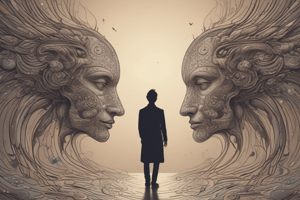Podcast
Questions and Answers
Which part of the brain is initially thought to control hunger, but is now known to regulate hunger through neural circuits?
Which part of the brain is initially thought to control hunger, but is now known to regulate hunger through neural circuits?
- Hypothalamus (correct)
- Medial nucleus
- Arcuate nucleus
- Paraventrical nucleus
What is the role of leptin in the regulation of hunger?
What is the role of leptin in the regulation of hunger?
- Produced by the stomach to stimulate hunger
- Produced by the hypothalamus to suppress hunger
- Produced by fat cells to provide information about the body's fat stores (correct)
- Produced by the pancreas to regulate glucose levels
What is the effect of too little insulin on the body?
What is the effect of too little insulin on the body?
- Decreased hunger
- Increased hunger (correct)
- Increased satiety
- No effect on hunger
What is the effect of ghrelin on the stomach?
What is the effect of ghrelin on the stomach?
What percentage of the incentive value of food is linked to availability, palatability, variety, and presence of others?
What percentage of the incentive value of food is linked to availability, palatability, variety, and presence of others?
What is the primary focus of incentive theories in understanding motivation?
What is the primary focus of incentive theories in understanding motivation?
According to drive theories, what is the primary motivator of behavior?
According to drive theories, what is the primary motivator of behavior?
Which of the following is NOT a biological motive?
Which of the following is NOT a biological motive?
What is the primary limitation of drive theories in understanding motivation?
What is the primary limitation of drive theories in understanding motivation?
What is the primary difference between drive and incentive approaches to understanding motivation?
What is the primary difference between drive and incentive approaches to understanding motivation?
What is the primary assumption of evolutionary theories of motivation?
What is the primary assumption of evolutionary theories of motivation?
What is the primary characteristic of the affiliative motive?
What is the primary characteristic of the affiliative motive?
What is a key aspect of the cognitive component of emotional experience?
What is a key aspect of the cognitive component of emotional experience?
What is the primary function of the thalamus in the emotional response?
What is the primary function of the thalamus in the emotional response?
What is the main idea behind the James-Lange theory of emotion?
What is the main idea behind the James-Lange theory of emotion?
What is a characteristic of the physiological component of emotional experience?
What is a characteristic of the physiological component of emotional experience?
Which of the following is NOT a fundamental emotion according to Paul Ekman's theory?
Which of the following is NOT a fundamental emotion according to Paul Ekman's theory?
What is a consequence of poor affective forecasting?
What is a consequence of poor affective forecasting?
Which neural structure plays a key role in the physiological component of emotional experience?
Which neural structure plays a key role in the physiological component of emotional experience?
What is a characteristic of the behavioral component of emotional experience?
What is a characteristic of the behavioral component of emotional experience?
What is the primary function of the sex drive?
What is the primary function of the sex drive?
Which of the following stages of the human sexual response cycle is characterized by physiological arousal building up more slowly?
Which of the following stages of the human sexual response cycle is characterized by physiological arousal building up more slowly?
What is the term for the period of time during which an individual is not responsive to sexual stimulation after orgasm?
What is the term for the period of time during which an individual is not responsive to sexual stimulation after orgasm?
What is the percentage of identical twins who both identify as gay, according to research?
What is the percentage of identical twins who both identify as gay, according to research?
What is the term for the need to master difficult challenges, outperform others, and to meet high standards of excellence?
What is the term for the need to master difficult challenges, outperform others, and to meet high standards of excellence?
Which of the following factors determines the tendency to pursue achievement in a particular situation?
Which of the following factors determines the tendency to pursue achievement in a particular situation?
What is the percentage of the population that identifies as gay, according to Kinsey's 7-point scale?
What is the percentage of the population that identifies as gay, according to Kinsey's 7-point scale?
Which of the following factors influences female sexuality more than male sexuality?
Which of the following factors influences female sexuality more than male sexuality?
Flashcards are hidden until you start studying
Study Notes
Motivation
- Motives are needs, wants, interests, and desires that propel people in certain directions
- Motivation involves goal-directed behavior
Theoretical Approaches
- Drive Theories: a hypothetical, internal state of tension that motivates an organism to engage in activities that should reduce this tension
- Incentive Theories: external stimuli regulate motivational states, pulling people in a particular direction
The Range of Motives
- Biological Motives:
- Survival
- Hunger
- Thirst
- Sex
- Sleep
- Social Motives:
- Affiliation
- Achievement
- Nurturance
- Exhibition
The Motivation of Hunger and Eating
- Biological Factors:
- Hypothalamus: regulates hunger, but not an on/off switch
- Glucose regulation: insulin plays a role in determining hunger
- Digestive regulation: ghrelin and CCK hormones regulate hunger and satiety
- Hormone regulation: leptin informs the hypothalamus about the body's fat stores
- Environmental Factors:
- Incentive value of food: availability, palatability, variety, presence of others
- Environmental cues: adverts
- Learned Preferences and habits: classical conditioning and observational learning
Sexual Motivation and Behaviour
- The Sex Drive: ensures the survival of the species
- The Biological Response:
- Human Sexual Response Cycle:
- Excitement Phase: physical arousal, vasocongestion
- Plateau Phase: physiological arousal builds
- Orgasmic Phase: peak of intensity
- Resolution Phase: physiological changes subside
- Human Sexual Response Cycle:
- Parental Investment: effects interest in sexual activity, promotes selective mating
- Sexual Orientations:
- Kinsey's 7-point scale
- Biology: hormonal secretion in critical periods of prenatal development
Achievement Motivation
- The need to master difficult challenges, outperform others, and meet high standards of excellence
- Correlates positively with success
- Factors influencing achievement motivation:
- Strength of motivation to achieve success
- Estimate of the probability of success
- Incentive value of success
Emotional Experience
- Emotion involves:
- Subjective conscious experience (cognitive component)
- Bodily arousal (physiological component)
- Characteristic overt expressions (behavioral component)
The Cognitive Component
- Highly personal and subjective experience
- Cognitive appraisals of events determine emotion
- Evaluative aspect: can be automatic/unconscious
- Poor affective forecasting: efforts to predict one's emotional reactions to future events
The Physiological Component
- Autonomic arousal: autonomic nervous system responsible for physical arousal
- Neural circuits: amygdala, hypothalamus, and structures in the limbic system
- Thalamic-amygdala-hypothalamic pathway: sensory information triggers autonomic arousal and hormonal responses
The Behavioral Component
- Emotions expressed in nonverbal behavior: body language
- Paul Ekman's facial cues: 6 fundamental emotions (happiness, sadness, anger, fear, surprise, and disgust)
- When contracting facial muscles, may experience the corresponding emotion
Theories of Emotion
- James-Lange Theory: conscious experience of emotion results from perception of autonomic arousal
- Cannon-Bard Theory: emotion occurs when the thalamus sends signals simultaneously to the cortex (conscious experience) and the autonomic (visceral arousal)
Studying That Suits You
Use AI to generate personalized quizzes and flashcards to suit your learning preferences.




